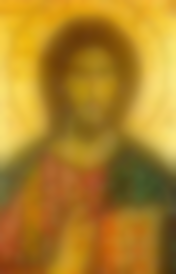by Fr. Patrick Henry Reardon
 Docetism, one of the earliest Christological heresies, derived its name from the Greek verb dokein—to “seem.” This name was descriptive: It indicated the teaching that God’s Son only “seemed” to be a human being. His presence on the earth, though real in itself, was conveyed by way of a revelatory appearance, not connected with His being. His humanity was a kindly illusion. According to this opinion, the Son of God wore a semblance of humanity, like a costume, as it were, a kind of actor’s mask. Donning this mask, He “played a part” in the human drama, rather like the various gods of the Iliad—or, for that matter, the biblical angels, who “appeared” on earth.
Docetism, one of the earliest Christological heresies, derived its name from the Greek verb dokein—to “seem.” This name was descriptive: It indicated the teaching that God’s Son only “seemed” to be a human being. His presence on the earth, though real in itself, was conveyed by way of a revelatory appearance, not connected with His being. His humanity was a kindly illusion. According to this opinion, the Son of God wore a semblance of humanity, like a costume, as it were, a kind of actor’s mask. Donning this mask, He “played a part” in the human drama, rather like the various gods of the Iliad—or, for that matter, the biblical angels, who “appeared” on earth.
Although this heresy stayed around for a long time—and maintained its voice even as late as the Qur’an (Sura 4:157-158)—the Christian Church was not slow to spot a significant problem with it. Namely, if the humanity of Jesus was only apparent—as distinct from real—then whatever He did in that apparent humanity was likewise only apparent. He only “appeared” to die for our sins, for example, and only “seemed” to rise for our justification.
One can detect vestiges of Docetism even today, I believe. Is there not a taint of it, for example, in the rather common suggestion that Jesus feigned ignorance from time to time? Thus, some folks tell us, when Jesus inquired whose hand in the crowd had touched him (Luke 8:45-46), He really knew whose it was; He was only pretending not to know. But isn’t pretense the very essence of Docetism?
Chalcedon’s declaration—in 451—that Jesus is “of one being [homoousios] with us with respect to His humanity” means the full assumption of the human condition, sin excepted. God’s Son, becoming flesh and dwelling among us, took on a truly human life, circumscribed in space, limited to a particular time and concrete set of circumstances. Against the Docetists, the holy orthodox and catholic faith affirms a complete Incarnation, not the pretense of one. It asserts a redemption of the human race “from within.” A single subject (hypostasis) is at once both divine and human, neither confused nor divided.
Thus, when Jesus slept—during a storm, for instance (Mark 4:38)—He was really asleep. When He sat down to rest, He was truly weary, and, when He asked for a drink, He was not pretending to be thirsty (John 4:6-7). Likewise, when Jesus professed not to know the time of the final judgment (Matthew 24:36 in the older manuscripts), we should not imagine Him juggling various preferences of mental reservation. However thin, façade and disguise are the very contrary of the Incarnation.
The one thing Jesus never did was deceive us.
The Incarnation was total and forever. When our humanity was seized, it was—save sin—without reservation; no holds were barred, nothing held back. This means that God’s Son flung Himself completely into our humanity, including the processes of thought and resolve. The “single subject” Christology of Chalcedon necessarily affirms the unity of Jesus’ self-awareness.
Consequently, there was not the scantest part of internal disguise or pretense in Christ. He did not peep, slyly but approvingly, over His own shoulder. He was not inwardly divided into actor and spectator, the one putting on a show and the other watching it. If we believe that the embrace of the Incarnation—a concrete humanity—was complete and without reserve, there could not have been a trace of the “docetic” in the inner life of Jesus.
When, as a man, Jesus committed His life and destiny to the Father, the obedience was utterly pure and unalloyed with self-regard. There was no “self-fulfillment” here. The only “fulfillment” was that of prophecy. His was a holocaust, in the original sense that God received the entire victim; the priest was left nothing on which to feed. Love for the Father and for us was His sole motive, and it was selfless in a way unparalleled in the history of mankind. Jesus suffered and endured all things, guided by no narrative except the demands of biblical prophecy. He told Himself no story separate from His own existence.
Everything was exactly as it seemed.
Rudolf Kassner expressed, perhaps, the most eloquent conviction on this point:
“I remain convinced that the God-man never, at any time, not even for a moment, however brief, saw or attempted to see his own face in a mirror.”
